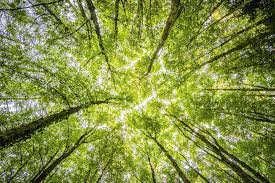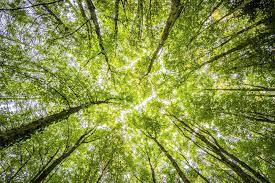
Sustainable forest management encompasses an enduring process that entails planting trees, nurturing their growth, harvesting them for various forest products, and subsequently replanting new trees to initiate the cycle again.
Rayonier initiated a forestry program in the late 1940s, marking the inception of our continuous cycle involving tree planting, harvesting, and replanting in our forests. Since then, we've successfully planted more than one billion trees, and this number keeps growing. In 2022 alone, we planted over 38 million seedlings in the United States and New Zealand. Approximately two-thirds of our land is under intensive management, and we are steadfast in our commitment to sustainable forestry for timber production, aiming to fulfill present needs without compromising those of future generations. This commitment is achieved through a land stewardship ethic that harmoniously integrates reforestation with the conservation of soil, air, and water quality, as well as the preservation of wildlife and fish habitats. The reforested areas not only contribute to biodiversity but also complement the natural forests within our portfolio.
Our employees engaged in a tree-planting event, demonstrating our dedication to sustainability.
Research and Development
We maintain an in-house research and development initiative designed to provide us with the knowledge, tools, and technology necessary for the sustainable management of our forests and the implementation of effective silviculture programs, aimed at improving tree growth and cultivation. Rayonier actively pursues research in several key areas, including genetics and tree enhancement, seedling production, biometrics, growth/yield analysis, environmental sustainability (including water and soil protection, biodiversity, and the conservation of threatened and endangered species), and carbon and climate impact.
Additionally, we collaborate on specific research projects with industry associations, other participants in the forestry sector, and university-industry partnerships. In the United States, Rayonier is a member of more than 30 university-industry cooperatives, granting us access to a wide range of basic and applied research programs supporting our forest management endeavors. In New Zealand, our staff actively participates in various Forest Owners Association committees, focusing on research and forest health. We also maintain a collaborative relationship with the University of Canterbury on a broad spectrum of forest research matters.
Tree Improvement and Forest Health
A continuous process of research, genetic selection, breeding, and testing allows us to incrementally enhance the productivity and value of our forests over successive rotation cycles. Our tree improvement efforts employ conventional breeding techniques, such as controlled pollination, and do not involve the use of Genetically Modified Organisms (GMOs). Our research primarily concentrates on identifying and breeding tree families that exhibit larger, straighter, and faster growth while simultaneously improving timber quality. Our program aims to bolster disease and pest resistance through meticulous genetic selection and site-specific silvicultural applications.
We also conduct research to identify more effective silvicultural treatments that promote the survival and growth of the trees we plant. This research includes monitoring forest conditions for invasive species, weed competition, tree survival rates, soil conditions, and pests. We judiciously apply herbicides, generally adhering to manufacturer-prescribed rates, only when necessary to control competing vegetation within our site-specific forest management operations. Our choice of treatment is guided by site-specific needs, as well as the safety and effectiveness of the herbicides employed.
Our research and development initiatives not only concentrate on existing forestry conditions but also delve into the long-term consequences of climate change and how it could potentially affect our business. This encompasses the assessment of expected alterations in weather patterns across various regions to gauge their potential impacts on the sustained health and productivity of our forests over the long run.
Harvest Planning
We depend on our internal analytical expertise, employing tools like wood flow models and other planning resources, to steer our long-term strategies and our estimates of sustainable yield. We define sustainable yield as the annual harvest level that we believe can be maintained indefinitely, determined by measurements of biological growth and the expected productivity resulting from our reforestation and silviculture endeavors. Our extended harvest plans, from which we derive our sustainable yield projections, typically span 60 years in the U.S. South and New Zealand, and 100 years in the U.S. Pacific Northwest.
In alignment with our dedication to sustainable forest management, we publicly disclose our annual sustainable yield for each of our three primary timber operating segments. Our estimated sustainable yield range, which falls between 10.7 and 11.6 million tons,1 experienced a slight increase from the previous year, reflecting the additional acreage acquired in 2022. Our sustainable yield, as well as our overall harvest strategy, undergo annual evaluation by our Board. In 2022, our harvest volume included the final harvests on approximately 93,000 acres, constituting roughly 3% of our total acreage, with replanting typically occurring within twelve months of the harvest.
Rayonier initiated a forestry program in the late 1940s, marking the inception of our continuous cycle involving tree planting, harvesting, and replanting in our forests. Since then, we've successfully planted more than one billion trees, and this number keeps growing. In 2022 alone, we planted over 38 million seedlings in the United States and New Zealand. Approximately two-thirds of our land is under intensive management, and we are steadfast in our commitment to sustainable forestry for timber production, aiming to fulfill present needs without compromising those of future generations. This commitment is achieved through a land stewardship ethic that harmoniously integrates reforestation with the conservation of soil, air, and water quality, as well as the preservation of wildlife and fish habitats. The reforested areas not only contribute to biodiversity but also complement the natural forests within our portfolio.
Our employees engaged in a tree-planting event, demonstrating our dedication to sustainability.
Research and Development
We maintain an in-house research and development initiative designed to provide us with the knowledge, tools, and technology necessary for the sustainable management of our forests and the implementation of effective silviculture programs, aimed at improving tree growth and cultivation. Rayonier actively pursues research in several key areas, including genetics and tree enhancement, seedling production, biometrics, growth/yield analysis, environmental sustainability (including water and soil protection, biodiversity, and the conservation of threatened and endangered species), and carbon and climate impact.
Additionally, we collaborate on specific research projects with industry associations, other participants in the forestry sector, and university-industry partnerships. In the United States, Rayonier is a member of more than 30 university-industry cooperatives, granting us access to a wide range of basic and applied research programs supporting our forest management endeavors. In New Zealand, our staff actively participates in various Forest Owners Association committees, focusing on research and forest health. We also maintain a collaborative relationship with the University of Canterbury on a broad spectrum of forest research matters.
Tree Improvement and Forest Health
A continuous process of research, genetic selection, breeding, and testing allows us to incrementally enhance the productivity and value of our forests over successive rotation cycles. Our tree improvement efforts employ conventional breeding techniques, such as controlled pollination, and do not involve the use of Genetically Modified Organisms (GMOs). Our research primarily concentrates on identifying and breeding tree families that exhibit larger, straighter, and faster growth while simultaneously improving timber quality. Our program aims to bolster disease and pest resistance through meticulous genetic selection and site-specific silvicultural applications.
We also conduct research to identify more effective silvicultural treatments that promote the survival and growth of the trees we plant. This research includes monitoring forest conditions for invasive species, weed competition, tree survival rates, soil conditions, and pests. We judiciously apply herbicides, generally adhering to manufacturer-prescribed rates, only when necessary to control competing vegetation within our site-specific forest management operations. Our choice of treatment is guided by site-specific needs, as well as the safety and effectiveness of the herbicides employed.
Our research and development initiatives not only concentrate on existing forestry conditions but also delve into the long-term consequences of climate change and how it could potentially affect our business. This encompasses the assessment of expected alterations in weather patterns across various regions to gauge their potential impacts on the sustained health and productivity of our forests over the long run.
Harvest Planning
We depend on our internal analytical expertise, employing tools like wood flow models and other planning resources, to steer our long-term strategies and our estimates of sustainable yield. We define sustainable yield as the annual harvest level that we believe can be maintained indefinitely, determined by measurements of biological growth and the expected productivity resulting from our reforestation and silviculture endeavors. Our extended harvest plans, from which we derive our sustainable yield projections, typically span 60 years in the U.S. South and New Zealand, and 100 years in the U.S. Pacific Northwest.
In alignment with our dedication to sustainable forest management, we publicly disclose our annual sustainable yield for each of our three primary timber operating segments. Our estimated sustainable yield range, which falls between 10.7 and 11.6 million tons,1 experienced a slight increase from the previous year, reflecting the additional acreage acquired in 2022. Our sustainable yield, as well as our overall harvest strategy, undergo annual evaluation by our Board. In 2022, our harvest volume included the final harvests on approximately 93,000 acres, constituting roughly 3% of our total acreage, with replanting typically occurring within twelve months of the harvest.


 Sustainable Forestry and Climate Change Analysis: Long-Term Planning
Sustainable Forestry and Climate Change Analysis: Long-Term Planning




 Companies
Companies